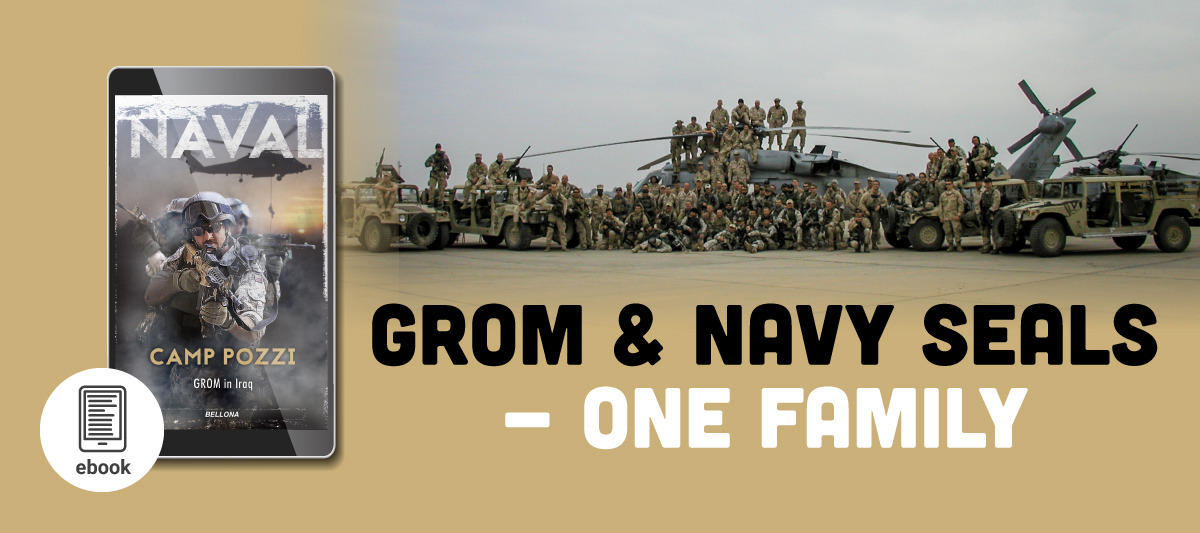Camp Pozzi

Being a Special Forces operator is a bit like being a high-performance athlete. But high-performance athletes have the advantage of knowing when the season starts and when it ends; they train with perfect timing to be fit for the games. But we, the operators, have to be in readiness for our games every night and day.
BILL POZZI
“Anybody home?” Right from very threshold of our bungalow reached us a hoarse voice of an elderly gentleman. The voice woke us up at high noon of our first day amid date palms of the settlement outside Saddam’s palace, somewhere at the outskirts of Baghdad.
“Hi, guys,” this musical greeting that followed sounded a whit warmer.
Our shared English proved to be good enough, so we were able to freely exchange greetings with our visitor and learn what he wanted from us, or rather, as it turned out, what that elderly fellow could do for us in our Iraqi reality.

“My name is Pozzi, Bill Pozzi, and I am the boss here,” he introduced himself to us, clad in American uniform pants and a brown T-shirt. “In case you need anything, lads, just bring me the list, and I’ll take care of that, or, if you’re in need, I’ll do the shopping in PX.”
That was how Bill Pozzi greeted us. At one time he might have been a strapping lad indeed. But in spite of age he lost nothing of his military appearance, and his small tummy only sort of dignified him. He brought us a box full of batteries.
“In this climate they run out in no time, guys, and as you generally operate at night, each of you must have a large supply of them,” he explained, putting the box on the table.

That is how I remember my first encounter with Bill Pozzi. Our visitor turned out to be one of the most aged, if not the most aged Navy SEAL in the history of that legendary US Navy unit, and he was a legend already in his own lifetime. His vast experience and involvement impressed people, and his age was only his advantage – Pozzi’s knowledge on how military bases, like ours in Baghdad, work, and on what is to live on the base, seemed unlimited. He continued to inquire us on practical, mundane matters, on things so common and ordinary that one is sometimes prone to forget them, even if they are a part of the soldier’s daily life. Bill Pozzi volunteered with US Navy when most of young male Americans did their best do steer clear of military service. Some of his mates even used cues to break their joints, or feigned football injuries, fearing “fit for duty” opinion of the draft board, which meant an unwanted conscription. But no wonder: in late 60. Indochina was the scene of heavy military activities (the Vietnam War), and after all not every young guy had a warrior’s soul.
Pozzi served first in the Navy Reserve. He firmly believed that it was safer there than in the infantry. He told us he’d served on a submarine but he didn’t like it. The vessel was as old as the hills and must have been operational during the Second World War. Pozzi was a diesel mechanic. Very often he went to bed with his head so grease-smeared that it kept slipping down of the pillow when he was asleep. But then he heard of the Navy SEALS and he found his place in their ranks for a long time (all an all for thirty years). At first, he told us, he thought that Navy SEALS had something to do with the “Sea Hunt” TV show with sunny beaches, girls, beer and all that, so why not to enlist? Thus on the very first day of our war service we got to know an authentic SEAL who began his service in Vietnam jungle. And after everyone of us has seen the Rambo – “First Blood” film?
During his service in Vietnam Pozzi, with other SEALS, secured one of the beaches before the Marines arrived. It was there that he confronted the enemy, took part in many combat missions including patrols. In later time he also secured the landing of Apollo 12. He volunteered to this task, which was by no means easy – when it was all over he was just as exhausted as the astronauts who returned from the Moon. So that was how he became the first SEAL to meet the Apollo 12 crew, he was proud to hear his name mentioned in TV news services. But when he volunteered to the first Gulf War in 1990, the Medical Board rejected him; being 54 years of age, he heard he was “too old, too plump and too dull” for further duty. However, being an outstanding expert he was sent to Iraq to greet us later on, in 2003, in Baghdad. Nobody reproached him that he too aged, not to mention reproaching him for his tummy. Pozzi played a major part in the task of getting our base ready. He built its infrastructure from scratch, took care of our supplies and he was also a dab on our vehicles. And he was a very generous man – he raised money in the base for a Catholic orphanage in Baghdad. But inside he remained the warrior until the last days of his service – occasionally he took part in combat tasks. The guy just adored the fight throughout his entire career. No wonder then that our base was named after him – Camp Pozzi. Jenny Pozzi Camp to be exact. Pozzi had a daughter, who was also in the service. He said that since there is a will to name the base after him, let be in honor not of him, but of her. Hence the full name of our base was Jenny Pozzi Camp.
